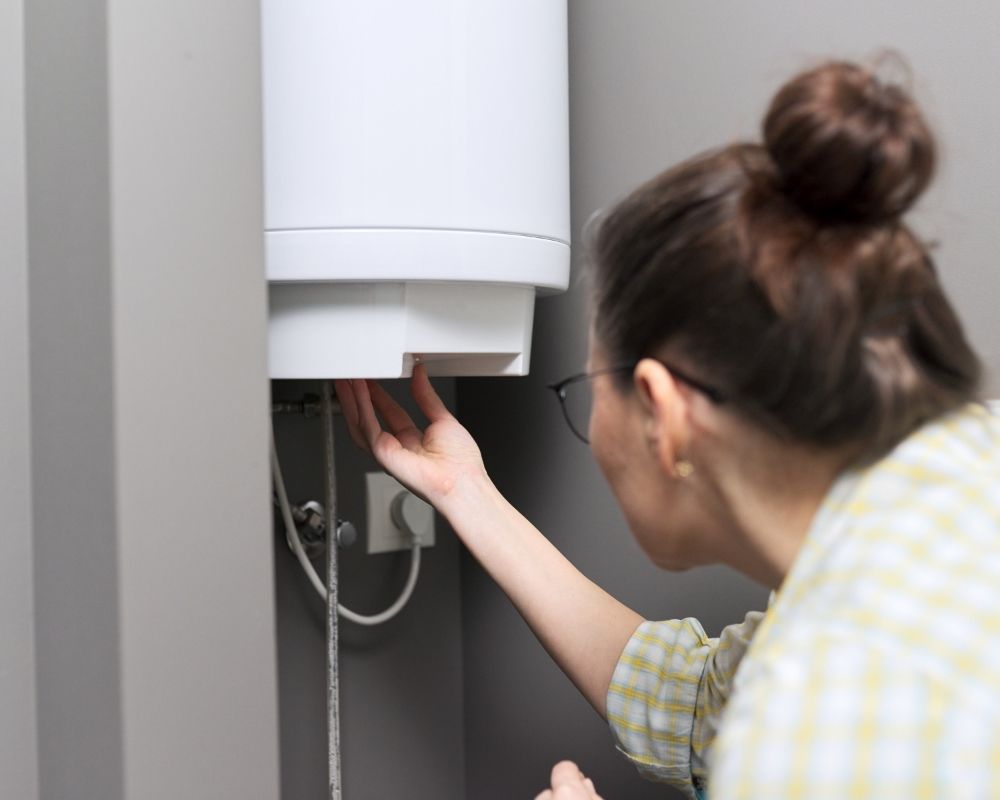While water heaters have a finite lifespan and eventually need replacing, there are a few key moves homeowners can make in order to extend the efficiency and years of use out of their hot water heater. Knowing the various factors specific to your home and lifestyle that influence your water heater’s health will allow you to save money from servicing, maintenance, and replacement in the long-term.
The lifespan of tank-based water heaters
Tank-based hot water heaters are subject to a lot of strain: they are constantly exposed to water, heat, and oxygen, making them prime targets for oxidative and pressure-based stress that will cause wear and tear. With many important components that need to be in good health to optimize the efficiency of your unit, the health of your hot water heater is directly linked to the status of your gaskets, valves, lines, plumbing, and water quality (among more).
Because a tank-based water heater is subject to such forces that inevitably degrade its structure and internal components, regular maintenance and servicing is absolutely key to keep it running safely and efficiently over the course of its lifetime. This regular maintenance and servicing only goes so far however: after a certain amount of time, water heaters need replacement as the cost of increasingly-frequent replacement and servicing begins to outweigh the cost of a new unit – not to mention the safety risks that grow over time with an older tank-based water heater.
For this reason, the general consensus among hot water heater technicians is to give tank-based water heaters between 8 and 12 years of life before they need to be replaced. After a decade of regular use, it is strongly recommended to consider looking into a new unit as the oxidative damage and the degradation of internal components will make your water heater inefficient and at-risk for leaking and pressure malfunctions. Left unattended, a malfunctioning water heater can flood your home or worse, explode.
A. What are a few factors that affect the lifespan of a tank-based water heater?
1. Water hardness
-
- Water hardness is one of the key factors that will affect the lifespan of your tank-based hot water heater. Hardness is a way to denote the general level of dissolved polyvalent metallic ions in your water. In less fancy terms, it gives you a gauge for the amount of metal compounds in your water that – when exposed to heat or when passing through the same spots (like the pipes in your home’s plumbing or your water heater’s tank – can build up to create limescale. Limescale is the hardened (calcified) state of these mineral compounds, often in the form of a molecular compound called calcium carbonate. Magnesium, iron, barium, manganese, and strontium are also present and are recorded when measuring the hardness of your water.
- The harder your water, the more readily it will build up in your pipes to create limescale. In regard to hot water heating, limescale is undesirable as it affects the way your unit creates flow through the system, how efficiently it heats, and the general integrity of the tank. Limescale build-up in your home’s plumbing system or in your water tank are very important to address: left unattended, hardened calcium carbonate can “insulate” the heating elements of your water tank by solidifying at the bottom of your unit, lowering the output temperature of your water and increasing the pressure risks from trapped moisture escaping to the surface. When it hardens in the tank and breaks off, limescale can bang against the sides of the unit, causing cracks in the structure and potentially creating a leaking risk. Furthermore, it can affect the quality of your drinking and bathing water: from cloudy hot water to skin-damaging showers, dealing with water hardness is part-and-parcel to maintaining a healthy plumbing and hot water system.
- Water hardness is different from area to area: depending on the reservoir of water your home uses (or that of your street, neighborhood, or city), your water heater may be subject to different levels of hardness-based wear. Natural water hardness comes from soil runoff in groundwater and surface water as well as rocks eroded by water sources. Industrial water hardness is measured in the prevalence of mining and chemical industries, largely in the way the byproducts of these industries make their way into the soil around it.
2. Size of tank and household demand
-
- The frequency and intensity with which you use your home hot water heater system is another key factor that will affect the lifespan of your unit. The size and capacity of the tank is thus intertwined with the demand. If you live in a household with lots of people that are using hot water throughout the day and at the same time, your water heater will have to work harder to constantly fill and maintain a consistently-depleting reservoir of water. Exposed to hard water and oxygen more than other units, if your tank isn’t appropriately-sized or capable for the household demand it has to deal with, you risk wearing down the components ahead of time and reducing your water heater’s lifespan. Having a clear idea of your peak water demand (in GPM – gallons per minute) on an average day will allow you to purchase the appropriate water heater that has the storing capacity and heating capability to handle whatever you throw at it.
B. How do you make your tank-based hot water heater last longer?
Now that we have a basic idea of the two key factors that affect a hot water heater’s health, let’s take a gander at some of the steps you can take to extend this lifespan. Keeping in mind that these units need replacing after a decade regardless, when you purchase a new hot water heater you can make some key modifications to your setup and maintenance regimen that will allow that decade to extend up to 15 years.
1. Expansion tanks
-
- One of the main natural factors that degrades the operation of your hot water heater is the pressure your tank undergoes in its regular heating, storing, and warming cycle. With limescale buildup in your home’s plumbing and within the water heater’s tank, flow rates and water expansion from heat cause stress on your piping and your tank. If not properly dealt with, extra force in the unit can cause hairline fractures within the tank’s structure as well as damage the important gaskets and valves that regulate pressure.
- As a response to these pressure risks, some technicians and manufacturers may recommend homeowners to purchase an expansion tank or purchase a hot water heater with an expansion tank built-in: this is a small tank attached to your water supply pipe that goes into the hot water heater. It is meant to minimize pressure inside the main tank by taking on extra water that is pushed out as a result of thermal expansion when heated. Having an expansion tank will minimize the pressure strain on your hot water heating unit, decreasing the general wear to the tank, the unit’s valves, plumbing fixture washers, and the general plumbing of your home.
2. Water softeners
-
- As we saw earlier, the hardness of your water is a key factor that will affect the rate at which your water heater deteriorates. If the water is too hard, limescale build-up occurs quicker in your plumbing and within the tank, affecting the efficiency of your unit’s heating potential and encouraging oxidative corrosion. Over years, unattended build-up can crack your tank and mess up the flow rate of your water.
- A great solution for homes with harder water is to invest in a water softener: by filtering the incoming hard water from your water main through a mineral tank that then sends the water out, the build-up of calcium carbonate in your plumbing is drastically reduced. Water softeners are tanks filled with negatively-charged resin or plastic beads: these negatively-charged beads attract the positively-charged ions present in calcium and magnesium minerals, effectively removing them from the incoming source and outputting significantly softer water that is then ready to be heated. Investing in a water softener will allow you to descale less frequently and will result in significantly less limescale-based wear on your hot water heating unit.
3. Insulation
-
- Insulating your home’s pipes and your hot water heater’s tank is a great way to extend the lifespan of your unit. By insulating the tank, stored hot water won’t need to be heated as often as it can stay at temp for longer. The efficiency benefits of this are incredible: some report up to 40% increases in energy efficiency. By using less constant power, your hot water heater’s internal components are subject to less wear. During warmer summer months, insulating your home’s pipes that feed into the water heater will reduce condensation from forming, thereby reducing the risk of oxidative corrosion.
4. Regular maintenance
-
- It goes without saying that regular maintenance will extend the lifespan of your hot water heater significantly. Doing regular flushing will help clear the tank of any debris and sediment build-up that can float around before solidifying into limescale. Descaling is a similar process where an acidic solution is run through the water heater in order to break down the hardened calcium carbonate which can then be removed from the unit. Another useful form of maintenance is the inspection and replacement of your water heater tank’s anode rod: the anode rod is a negatively-charged aluminum or magnesium rod that attracts the positively-charged calcium and magnesium ions in hard water. The anode rod thus attracts these minerals and will direct the oxidation away from the heater’s tank or metal components and instead isolate it to the rod. Once the rod is too oxidized, it stops working and corrosion begins to occur on the unit itself.
- Having a technician regularly service your machine (yearly or even biannually based on the hardness of your water and the extent of your use) will do wonders for the health and efficiency of your hot water heater. You’ll save money on maintenance in the long-run by being proactive and staying on top of your hot water heater’s health.
5. Staying aware
-
- A very important part of maintaining your water heater and extending its lifespan is simply to be aware of it: regularly inspecting your unit and observing changes in its behavior will allow you to quickly pick up on changes that – if addressed quickly – can avoid your water heating system from spiralling into expensive or destructive malfunctions. In this sense, investigating new noises from your water heater (often a sign of limescale build-up), noting changes in your water quality (like color, taste, temperature), picking up on smells around your heater (can indicate malfunctions in gas lines for gas-fueled units), and noting moisture around your tank (often a sign of pressure valves operating incorrectly) will allow you to be proactive about servicing your unit. By catching these issues early on, you avoid risking a bigger malfunction that may need expensive repairs or worse, replacement before its time.



